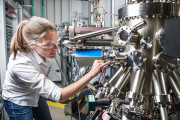
Smart Manufacturing for America's Revolutionizing Technological Transformation
sites.google.com/view/nsfsmart/home
Smart manufacturing combines automated processes with networks of advanced sensors, data analytics, and information and communication technologies to improve the productivity of companies. It has been widely recognized as a groundbreaking technological trend with the potential to transform manufacturing industries. Smart manufacturing was first defined by the United States in 2015. However, current efforts in the United States have not resulted in the growth of a workforce trained to utilize smart manufacturing techniques. Many individuals are not quite sure what is involved in smart manufacturing, what is its importance, or how it applies to their companies. To overcome this knowledge gap, it is important for technician educators to have opportunities to become well-informed about such advances in technology. They are then able to properly prepare technicians with the skills needed for rapidly-changing industries. In this project, training workshops and resources will be created and offered for educators in mechatronics and engineering technology programs. These resources will also be made available to manufacturers and local industries to increase their involvement with this technology area. The project will contribute to improving the education of future manufacturing technicians and the nation's workforce.
The goals of the project will be to: 1) create educational modules and workforce development tools on smart manufacturing; 2) identify the skill sets and needs of smart manufacturing professionals; 3) develop a repository that serves as a knowledge base for industry and STEM educators; 4) increase awareness about smart manufacturing; and 5) develop a knowledge base of best practices for Industrial Assessment Center (IAC) site visits. In this project, the educational modules on smart manufacturing will be implemented in train-the-trainer workshops and webinars. Topics covered in the modules will include: an overview of technologies used in smart manufacturing; sustainable manufacturing; additive manufacturing; the fourth industrial revolution and manufacturing innovations; data science in manufacturing; and adaptive control systems and machine intelligence. An online platform will be established as the repository for the developed materials and resources, and will allow educators and manufacturing personnel in industry to exchange ideas on applications and techniques for smart manufacturing. Results from the project will be widely disseminated within technical communities and venues.






